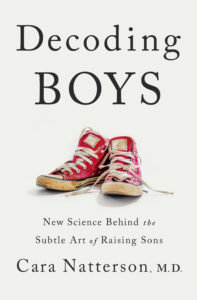Decoding Boys by Cara Natterson, M.D. (Book Excerpt)
 I am a big advocate of teaching kids about brain maturation and myelin. If the knowledge helps us as parents, imagine the difference it makes to a kid who can understand the why of his behavior. If you feel like you cannot teach the topic yourself, just have your teenager read this chapter—kids constantly tell me that understanding the biology is the first step toward better decision-making.
I am a big advocate of teaching kids about brain maturation and myelin. If the knowledge helps us as parents, imagine the difference it makes to a kid who can understand the why of his behavior. If you feel like you cannot teach the topic yourself, just have your teenager read this chapter—kids constantly tell me that understanding the biology is the first step toward better decision-making.
It’s also tremendously empowering for kids (and their parents) to appreciate the impact of pubertal hormones without feeling victimized by them. Hormones circulate throughout the body, and that means they impact the brain. Good to know. Better yet, we should all begin to identify how these chemicals make us feel—in puberty and beyond. That way, we can anticipate and manage those feelings.
Ideally, we will avoid putting our sons’ brains in situations they cannot handle. This is where the word “no” comes in handy. If your son is asking to hang out with a friend who has been getting into trouble lately, or if he’s begging to go to a party where there will be no supervision, or even if he just wants to keep his phone in his room each night and you know he cannot resist the temptation to be on it endlessly . . . say no. He will give you all the right reasons for why you shouldn’t worry, but that’s his prefrontal cortex talking. Outside of your home, or even just behind a closed bedroom door, peer influence turns up the volume of his limbic system. Why put our kids in situations where their brains will be primed to choose a worrisome path? There will be plenty of scenarios where our sons will find themselves in over their heads, so let’s help them to opt out of the ones that can be anticipated. The prefrontal cortex won’t mature any faster if it’s put into tricky situations.
Bad choices can result from the developmental fact that tween and teen brains just can’t make the smartest decisions in the moments when their limbic systems dominate. This is why their choices can be so different depending upon where they are or who is asking a particular question. It all comes down to pruning and myelination, which they are in the middle of.
How to Talk to Boys About . . . Brain Development
- CONNECT BIOLOGY WITH DECISION-MAKING. It really helps kids to understand that our parenting choices are related to their ability to make smart decisions. It’s not that we don’t trust them (though sometimes we don’t trust them) but rather that we don’t trust their brains to do the right thing. And with good reason! So explain brain maturation as best you can, read this chapter together, or find a video online that explains the topic clearly (for older kids who like videos, I always recommend SciShow by Hank Green).
- TEACH PAUSING STRATEGIES SO THAT MESSAGES CAN GET TO THE PREFRONTAL CORTEX, TOO. Teach your son (or daughter!) to take a moment before making a choice that’s not obviously smart and safe. How? Count to ten, or breathe in and out slowly for a few breaths, or, if time allows, take a longer break to go for a walk, shoot some hoops, journal . . . whatever helps to clear the mind. This is a real thing by the way, and allows for more even distribution of signaling throughout the brain.
- START WITH THE POSITIVE. There’s a reason the most successful bosses, teachers, and other voices of authority begin a tough conversation with a note of praise: it makes criticism easier to receive. So if your son has been making poor decisions, don’t start a conversation by diving right into the dark deep end of the pool. Try to give a little bit of love first. Tell him how proud you are that he rocked his math test before you lay into him about spending three hours gaming, not to mention the scraps of food and dirty socks left behind at the scene. Or thank him for doing the dishes before you remind him to clean up his room. This approach can be a game changer. It can also be tough advice to follow if he’s done something really egregious—in those cases it’s fine to not start with praise!

Cara Natterson, M.D., is a pediatrician, popular speaker, consultant, and New York Times bestselling author of multiple parenting and health books, including The Care and Keeping of You, a three-book series with more than six million copies in print, and Guy Stuff, the corollary for boys. A graduate of Harvard College and Johns Hopkins Medical School, Natterson trained in pediatrics at the University of California at San Francisco. After working as a general pediatrician for many years, she founded Worry Proof Consulting, a first-of-its-kind practice offering parents open-ended appointments. She also provides medical expertise for numerous parenting websites and serves on several boards including Starlight Children’s Foundation, Mattel’s Barbie Council, The Honest Company’s medical advisory, and Zemcar, a safe rides service for children. She lives in Los Angeles with her husband and their two teenagers.
Copyright © 2020 by Cara Natterson
All rights reserved.
Published in the United States by Ballantine Books, an imprint of Random House, a division of Penguin Random House LLC, New York.
Tags: brain development, decoding boys, dr. cara natterson, having a family, pediatrician, raising a daughter, raising a son, raising a teen















